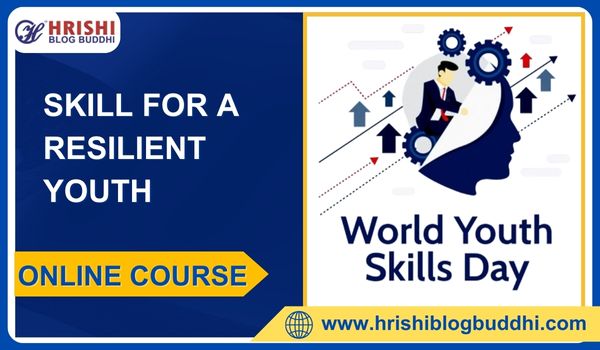In today’s fast-changing world, where technology is advancing really quickly, it’s super important to make sure young people have the right skills. Being able to adjust to new things, learn, and come up with new ideas is super important for doing well in jobs around the world. As we deal with all the complicated stuff happening in the 21st century, it’s really necessary to spend time and effort helping young people learn the skills they need. This article talks about why it’s so important for young people all around the world to learn new skills and how working together can make everyone smarter and more successful. World Youth Skills Day emphasizes the significance of this effort, highlighting the need for collaboration in ensuring the youth are equipped for success in the evolving global landscape.
Understanding the Global Skills Landscape
The global landscape of skills is undergoing a profound transformation. Traditional job roles are being reshaped, and new ones are emerging. Automation and artificial intelligence are changing the nature of work, making it essential for the youth to acquire skills that are not only relevant today but also adaptable to the challenges of tomorrow.
In many parts of the world, a significant gap exists between the skills young people possess and those demanded by the job market. Bridging this gap requires a holistic approach that addresses not only technical skills but also soft skills such as communication, critical thinking, and creativity. The World Economic Forum predicts that by 2030, over one billion jobs will be transformed by technology, highlighting the urgency for a comprehensive strategy in youth skills development.
The Power of Collaboration: Growing Smarter Together
To effectively address the challenges of a rapidly evolving job market, a collaborative effort on a global scale is essential. Governments, educational institutions, businesses, and non-profit organizations must work hand in hand to create a conducive environment for nurturing the skills required for the future.
1. Government Initiatives
Governments play a pivotal role in shaping the education and skills development landscape. Policy frameworks need to be dynamic, reflecting the changing needs of industries. Investing in education infrastructure, providing financial support for skill-building programs, and fostering partnerships between the public and private sectors are critical steps governments can take to empower their youth.
2. Educational Institutions as Catalysts
Educational institutions are the breeding grounds for future talent. They need to evolve from traditional models to more dynamic, adaptive systems. Incorporating technology in education, emphasizing practical applications of knowledge, and encouraging interdisciplinary learning can prepare students for the multifaceted challenges of the workforce.
3. Industry Engagement
Businesses, both large and small, have a vested interest in a skilled workforce. Collaborating with educational institutions, they can actively participate in curriculum design, provide internships, and offer mentorship programs. This not only ensures that graduates are job-ready but also fosters a symbiotic relationship between academia and industry.
4. Non-Profit Organizations and Community Involvement
Non-profit organizations can act as catalysts for change, filling gaps where governmental and private initiatives might fall short. Community-based skill-building programs, mentorship initiatives, and scholarship opportunities can make a significant impact on the lives of young individuals, especially in underserved communities.
Key Skills for the Future
As we strive to equip the youth with the skills necessary for the future, it’s essential to identify key areas of focus. The following skills are considered indispensable for navigating the complexities of the modern world:
1. Digital Literacy
In an era dominated by technology, digital literacy is non-negotiable. From basic computer skills to coding and data analysis, a strong foundation in digital literacy opens doors to a plethora of opportunities.
2. Critical Thinking and Problem Solving
The ability to analyze information critically and solve complex problems is a skill that transcends industries. Encouraging students to think independently and approach challenges creatively enhances their adaptability.
3. Communication Skills
In a globalized world, effective communication is paramount. Both verbal and written communication skills, along with the ability to collaborate in diverse teams, are essential for success in the workplace.
4. Emotional Intelligence
Understanding and managing one’s emotions and empathizing with others are crucial for building strong interpersonal relationships. Emotional intelligence is a key determinant of leadership and teamwork.
5. Lifelong Learning
Given the rapid pace of technological advancements, a commitment to lifelong learning is imperative. The ability to acquire new skills and adapt to changing circumstances ensures long-term employability.
Success Stories: Models for World Youth Skills Development
Several countries and organizations have successfully implemented strategies for youth skills development. Singapore, for instance, has a robust SkillsFuture initiative that encourages individuals to pursue lifelong learning and upskilling. The apprenticeship programs in Germany serve as a model for integrating education with practical work experience.
On a broader scale, initiatives like the United Nations’ Sustainable Development Goal 4, which aims to ensure inclusive and equitable quality education, and Goal 8, which focuses on promoting sustained, inclusive, and sustainable economic growth, emphasize the importance of skills development for youth worldwide.
Challenges and Solutions
While the path towards comprehensive youth skills development is promising, it is not without challenges. Access to quality education, especially in developing countries, remains a significant hurdle. Economic disparities, gender inequalities, and cultural biases can also hinder the equitable distribution of skills development opportunities.
To address these challenges, innovative solutions are required. Digital platforms and online learning can bridge geographical gaps and provide access to educational resources. Scholarships and financial aid programs can make education more accessible to marginalized communities. Moreover, breaking down gender stereotypes and promoting inclusivity in education and the workforce can contribute to a more balanced and skilled global population.








